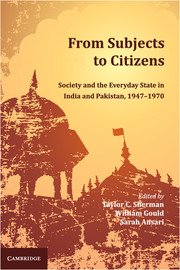Book contents
- Frontmatter
- Contents
- Acknowledgements
- Introduction
- 1 Personal Law and Citizenship in India's Transition to Independence
- 2 From Subjects to Citizens? Rationing, Refugees and the Publicity of Corruption over Independece in UP
- 3 Performing Peace: Gandhi's Assassination as a Critical Moment in the Consolidation of the Nehruvian State
- 4 Migration, Citizenship and Belonging in Hyderabad (Deccan), 1946–1956
- 5 Punjabi Refugees' Rehabilitation and the Indian State: Discourses, Denials and Dissonances
- 6 Sovereignty, Governmentality and Development in Ayub's Pakistan: The Case of Korangi Township
- 7 Everyday Expectations of the State during Pakistan's Early Years: Letters to the Editor, Dawn (Karachi), 1950–1953
- 8 Concrete ‘Progress’: Irrigation, Development and Modernity in Mid-Twentieth Century Sind
- 9 Partition Narratives: Displaced Trauma and Culpability among British Civil Servants in 1940s Punjab
- Contributors
- Index
6 - Sovereignty, Governmentality and Development in Ayub's Pakistan: The Case of Korangi Township
Published online by Cambridge University Press: 05 February 2014
- Frontmatter
- Contents
- Acknowledgements
- Introduction
- 1 Personal Law and Citizenship in India's Transition to Independence
- 2 From Subjects to Citizens? Rationing, Refugees and the Publicity of Corruption over Independece in UP
- 3 Performing Peace: Gandhi's Assassination as a Critical Moment in the Consolidation of the Nehruvian State
- 4 Migration, Citizenship and Belonging in Hyderabad (Deccan), 1946–1956
- 5 Punjabi Refugees' Rehabilitation and the Indian State: Discourses, Denials and Dissonances
- 6 Sovereignty, Governmentality and Development in Ayub's Pakistan: The Case of Korangi Township
- 7 Everyday Expectations of the State during Pakistan's Early Years: Letters to the Editor, Dawn (Karachi), 1950–1953
- 8 Concrete ‘Progress’: Irrigation, Development and Modernity in Mid-Twentieth Century Sind
- 9 Partition Narratives: Displaced Trauma and Culpability among British Civil Servants in 1940s Punjab
- Contributors
- Index
Summary
Introduction
The politics around the construction of Korangi Township in Karachi offer an excellent access point to a better understanding of the inner workings ofthe post-colonial Pakistani state in the late 1950s and 1960s. It was very much an ‘everyday’ project, in the sense that it affected the ‘everyday’ lives of ordinary and mostly poor refugees as they had to create meaningful habitats around concrete plinths, asbestos cement sheets and communal water taps. Korangi was also an extraordinary spectacle. It was one of the most important development projects of the Ayub period and was heralded in the international media as the largest mass housing initiative in Asia. Its short-term success was emblematic for what a military regime could do in a country with a dismal track record of state efficiency. Presidents of the United States, European royalty and international development experts all came to visit and admire. Above everything, Korangi came to demonstrate how deeply the local and ‘everyday state’ in Pakistan was intertwined with the national and international ‘state’.
Research into the nature of the postcolonial state in Pakistan has remained largely untouched by recent advances in the study of the state in South Asia more generally. A substantial literature about various aspects of Pakistani politics does of course exist—particularly in the fields of civil-military relations, elite politics, international relations and security studies—but it tends to be top-down in its orientation, and often lacks historical depth as well as radical theoretical incisiveness. More specifically, a narrative overridden with nostalgia still overshadows interpretations of the first martial law period.
- Type
- Chapter
- Information
- From Subjects to CitizensSociety and the Everyday State in India and Pakistan, 1947–1970, pp. 143 - 171Publisher: Cambridge University PressPrint publication year: 2014



